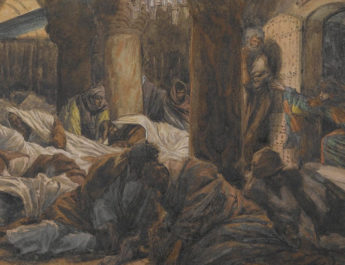Psalm 145:8-9, 14-21
Proper 13A
8 The LordA is graciousB and merciful,C
A “Lord” = YHVH. From havah (to be, become) or hayah (to come to pass, become, be). This is the name of the God of Israel, the self-existent and eternal one, the tetragrammaton. This pronunciation has been lost to time so “Lord” is generally used in its place.
B “gracious” = channun. 13x in OT. From chanan (beseech, show favor, be gracious; properly, to bend in kindness to someone with less status). This is gracious, compassionate, merciful, having pity on.
C “merciful” = rachum. 13x in OT. From the same as rechem (womb); from racham (to love, have compassion, have mercy); from racham (compassion, tender love, womb, compassion; the womb as that which cherishes the fetus). This is compassionate or merciful.
slowD to angerE and aboundingF in steadfast love.G
D “slow” = arek. 15x in OT. From arak (to be long in a literal or figurative sense, to continue, defer, draw out, endure, delay). This is long, patience, or slow.
E “anger” = aph. From anaph (to be angry; properly, breathing hard as a signifier of being enraged). This properly refers to the nose or nostril and by extension the face. It can specifically refer to anger or wrath as one breathes hard and nostrils flare in times of great anger.
F “abounding” = gadol. From gadal (to grow up, become great, become wealthy – to advance. The root meaning may be to twist in the sense of the process of growing). This is great, high, bigger, noble, old, marvelous. It can also refer to someone who is powerful or distinguished.
G “steadfast love” = chesed. From chasad (being good, kind, merciful; may mean bowing one’s neck as is done in the presence of an equal for courtesy’s sake; so, if one in a superior position is treating you like an equal, that is what is captured here). This is favor, goodness, kindness, loving kindness, pity, reproach, or a good deed. When done by God to humanity, this is mercy/loving kindness. When done by humanity to God, it is piety.
9 The Lord is goodH to all,I
and his compassionJ is over all that he has made.K
H “good” = tob. From tob (to be pleasing, to be good). This is good, beautiful, pleasant, agreeable, bountiful, at ease. This word is used for goodness as a concept, a good thing, a good person. This can refer to prosperity and welfare as well as joy, kindness, sweetness, and graciousness. So, this is ethically good, but also enjoyably good.
I “all” = kol. From kalal (to complete). This is all or every.
J “compassion” = racham. Related to “merciful” in v8. See note C above.
K “that…made” = maaseh. From asah (to do, make, accomplish, become). This is a work – any action whether positive or negative. It can also be a transaction, construction, activity, property, or something that is produced.
14 The Lord upholdsL all who are fallingM
and raises upN all who are bowed down.O
L “upholds” = samak. This is to lean, rest, support, brace, uphold, sustain, or establish. It is to lean on in a positive or negative sense.
M “falling” = naphal. This is to fall, whether by accident, to fall prostrate, or to fall in violent death. Figuratively, it can refer to personal ruin or calamity, a city falling, an attack or a falling away. It can also be a deep sleep or wasting away.
N “raises up” = zaqaph. 2x in OT. This is to raise or lift up. Figuratively, it can mean to comfort.
O “bowed down” = kaphaph. 5x in OT. This is to bend, bow, or curve. It is used for bowed down (as in oppressed), a bulrush bowing, and bowing before God.
15 The eyesP of all lookQ to you,
and you giveR them their foodS in due season.T
P “eyes” = ayin. This is eye in a literal or figurative sense so eye, appearance, favor, or a fountain (the eye of the landscape).
Q “look” = sabar. 8x in OT. This is to look, inspect, wait. It can imply watching for in a hopeful and patient manner.
R “give” = natan. This is to give, put, set, offer. It is to give literally or figuratively.
S “food” = okel. From akal (to eat, devour, burn up, or otherwise consume; eating in a literal or figurative sense). This is food, supply of provisions, the act of eating, or the time when one eats.
T “due season” = eth. Probably from anah (to answer, sing, announce); from ad (forever, all, old); from adah (to pass on, advance, decorate oneself). This is a period or season. It can also mean whenever or continually.
16 You openU your hand,V
satisfyingW the desireX of everyY living thing.Z
U “open” = pathach. This is to open wide in a literal or figurative sense. So, it is open, draw out, let something go free, break forth. It can also mean to plow, engrave, or carve.
V “hand” = yad. This is hand, ability, power. Hand in a literal sense, but also what one can do or the means by which one does it.
W “satisfying” = saba. To be satisfied or full in a literal or figurative sense. Also, to have plenty of.
X “desire” = ratson. From ratsah (to be pleased with, delight, take pleasure in, or accept with favor; to approve or consent regarding something; can be used specifically of satisfying debts or being pardoned). This is delight shown in favor, good will, something that is accepted or acceptable.
Y “every” = kol. Same as “all” in v9. See note I above.
Z “living thing” = chay. From chayah (to live or keep alive literally or figuratively). This is alive, living, lifetime. It can also be used to describe someone’s age. It can refer to animals, plants, water, or a company or congregation of people. It is life in a very broad sense.
17 The Lord is justAA in all his waysBB
and kindCC in all his doings.DD
AA “just” = tsaddiq. From the same as tsedeq (rightness, righteousness, just cause, vindication; that which is right in a natural, moral, or legal sense; abstractly equity; figuratively prosperity). This is just, innocent, righteous, righteous one, or lawful.
BB “ways” = derek. From darak (to tread, march, to walk. Can also mean affixing a string to a box since one needs to step on it to bend it in the process; so also an archer). This is a road as a thing that is walked on. Can be used figuratively for the path that one’s life takes or how one chooses to live one’s life.
CC “kind” = chasid. Related to “steadfast love” in v8. From chasad (see note G above). This is faithful, kind, pious, merciful, or gracious. It can also refer to godly or pious people. This is where Chasidic Jews take their name from.
DD “doings” = maaseh. Same as “that…made” in v9. See note K above.
18 The Lord is nearEE to all who call onFF him,
to all who call on him in truth.GG
EE “near” = qarob. From qarab (to come near, offer, make ready). This is near whether nearby, related, near in time, or allied.
FF “call on” = qara. This is to call or call out – to call someone by name. Also used more broadly for calling forth.
GG “truth” = emet. From aman (to believe, endure, fulfill, confirm, support, be faithful, put one’s trust in, be steadfast. Figuratively, this is to be firm, steadfast, or faithful, trusting, believing, being permanent, morally solid). This is firmness or stability. Figuratively, it is faithfulness, truth, or trustworthiness. This is the same root that “amen” comes from.
19 He fulfillsHH the desire of all who fearII him;
he also hearsJJ their cryKK and savesLL them.
HH “fulfills” = asah. Related to “that…made” in v9. See note K above.
II “who fear” = yare. From the same as yare (to fear, be afraid, dreadful; also fearful reverence – to fear in a moral sense is to say to revere, respect). This is fearful or morally reverent.
JJ “hears” = shama. This is to hear, call, consent, or consider. It implies listening intelligently, giving attention, and, because of these two factors, obedience and action are often implied.
KK “cry” = shavah. 11x in OT. From shava (crying or shouting aloud; seeking freedom from some kind of trouble). This is cry, cry for help.
LL “saves” = yasha. To deliver, defend, help, preserve, rescue, be safe. Properly, to be open, wide or free, which implies being safe. Used causatively, it means to free.
20 The Lord watches overMM all who loveNN him,
but all the wickedOO he will destroy.PP
MM “watches over” = shamar. This is to keep, watch, or preserve. It means to guard something or to protect it as a thorny hedge protects something.
NN “love” = aheb. This is to love, beloved, friend. It is to have affection for sexually or otherwise.
OO “wicked” = rasha. This is morally wrong so it refers to someone who is actively bad as wicked, criminal, an evil person, offender, condemned, or ungodly.
PP “destroy” = shamad. This is to demolish, destroy, perish, overthrow, pluck down.
21 My mouthQQ will speakRR the praiseSS of the Lord,
QQ “mouth” = peh. This is mouth in a literal or figurative sense. So, more literally, it can be beak or jaws. More figuratively, it refers to speech, commands, or promises.
RR “speak” = dabar. This is generally to speak, answer, declare, or command. It might mean to arrange and so to speak in a figurative sense as arranging words.
SS “praise” = tehillah. From halal (to praise, be boastful). This is praise or a song of praise. It is to offer God a hymn, to boast in God. This shares a root with “hallelujah.”
and all fleshTT will blessUU his holyVV nameWW foreverXX and ever.YY
TT “flesh” = basar. From basar (being a messenger, publish, carry preach; properly, this is being fresh, rosy or cheerful as one bearing news). This is flesh, the body, fat, skin, self, nakedness, humankind, or kin. It can also refer to private parts.
UU “bless” = barak. This is to kneel, to bless. It is blessing God as part of worship and adoration or blessing humans to help them. It can be used as a euphemism to say curse God.
VV “holy” = qodesh. This is set apart and so sacred. God is different from us and so God is holy/set apart. Things we dedicate to God’s service are set apart for God and so they, too, are holy, etc.
WW “name” = shem. May be from sum (to put, place, set). This is name, fame, renown. A name was thought to indicate something essential about a person – something about their individuality. So, this word can also mean honor, authority, or character.
XX “forever” = olam. This is a long scope of time whether in the past (antiquity, ancient time) or in the future (eternal, everlasting).
YY “ever” = ad. Related to “due season” in v15. See note T above.
Image credit: “Baby Crane with Breakfast (Lake Woodruff National Wildlife Refuge)” by Andrea Westmoreland, 2011.




